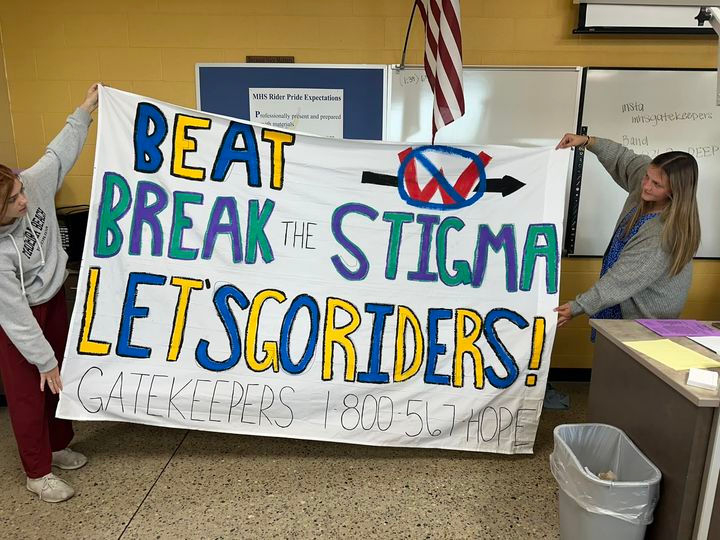Exploring the Impact of Positive Peer Advocates in School Mental Health and Suicide Prevention
- PASS
- Oct 16, 2024
- 4 min read
Mental health awareness in schools is more important than ever. As students face increasing pressures, having a strong support system can make a significant difference. One effective approach to promoting mental health and preventing suicide is through student-led organizations called Positive Peer Advocates (PPA). These groups not only raise awareness but also actively engage peers in meaningful discussions about mental health and suicide prevention.
With the support of trained prevention specialists from PASS (Prevention Awareness Support Services) and dedicated school staff, Positive Peer Advocate groups are currently thriving in over 30 schools in the PASS service area. Their growth highlights their vital role in fostering a positive school culture and supporting student well-being.
In this blog post, we will explore the benefits of participating in Positive Peer Advocate groups, how they operate, and the broader impact they have on students and their school environments.

Understanding the Mission of Positive Peer Advocates
The mission of Positive Peer Advocates is clear: empower students to participate actively in conversations about mental health and suicide prevention. These groups work to reduce the stigma that often surrounds mental health issues, creating an open and safe space for students to express their feelings and experiences.
By discussing a range of relevant topics, students help cultivate an environment that promotes transparency and support. This is particularly crucial in schools where students might feel alone or uncertain about seeking help.
The Advantages for Student Participants
Joining Positive Peer Advocate groups comes with a wide array of benefits, including:
Engage in Meaningful Conversations
In group settings, students delve into critical conversations about mental health. For instance, during monthly meetings, students might explore topics such as anxiety related to academic performance or the pressures of social media. This engagement fosters empathy and understanding among peers, allowing students to recognize they are not alone in their struggles.
Training in Suicide Prevention
One significant advantage of being part of a PPA group is the comprehensive training received in suicide prevention. According to a study by the American Foundation for Suicide Prevention, individuals who receive training in recognizing warning signs can intervene effectively, potentially saving lives. Students learn to identify distress signals, such as withdrawal or changes in behavior, empowering them to become advocates for mental wellness within their schools.
Develop Essential Leadership Skills
PPA groups provide an excellent platform for developing leadership abilities. Taking on officer roles, students may learn how to lead meetings or plan events. For example, a group might organize Mental Health Awareness Month activities, boosting their organizational and public speaking skills. These experiences build confidence and create opportunities for future endeavors.
Participate in Team and Trust Building
PPA groups incorporate engaging team-building exercises that foster trust and camaraderie among members. Simple activities, like icebreaker games or group challenges, help establish strong relationships where students feel comfortable sharing thoughts and feelings. This sense of connection significantly enhances the group dynamic and ensures a supportive environment.
Have a Voice in Group Initiatives
Students involved in Positive Peer Advocate groups are not mere participants; they actively shape the group’s agenda and the school’s prevention efforts. For instance, members might decide to plan a Mental Health Day for their school. Their input ensures that programs are relevant and impactful, reflecting their unique challenges and perspectives.

The Essential Role of Schools
For Positive Peer Advocate groups to thrive, schools play a crucial role in their implementation. Collaboration with PASS specialists is key to developing effective training programs and creating an inclusive setting where mental health discussions are encouraged.
Support from school staff and administration can provide the foundational structure needed for these peer-led initiatives. Statistics suggest that when schools prioritize mental health initiatives, students benefit tremendously—schools with mental health programs report up to a 20% decrease in absenteeism.
Extending Impact Beyond School Walls
The influence of Positive Peer Advocate groups stretches beyond the school environment. Students often carry the knowledge and awareness they gain into their broader communities. For example, some students may participate in local mental health awareness campaigns or host community events that promote mental well-being.
By engaging in outreach, these young leaders can spread the vital message of mental health awareness and suicide prevention, benefitting their community. This grassroots approach helps demonstrate the importance of mental health discussions across various societal aspects.
Taking Action Together
Positive Peer Advocate groups represent a powerful initiative in addressing mental health issues and suicide prevention within schools. They create safe spaces for open dialogue, empowering students through leadership roles and fostering meaningful engagement in crucial discussions.
As these organizations continue to flourish, it is essential for school administrations, staff, and community members to support their growth. Together, we can cultivate an environment where mental health is prioritized, and every student feels supported and valued.
For more information on becoming involved with Positive Peer Advocates, please reach out to Bethan Miller at bmiller@passaah.org.
By fostering more peer-led initiatives, we take significant steps toward building a culture that values mental health and encourages individuals to seek support without fear of stigma.



Comments